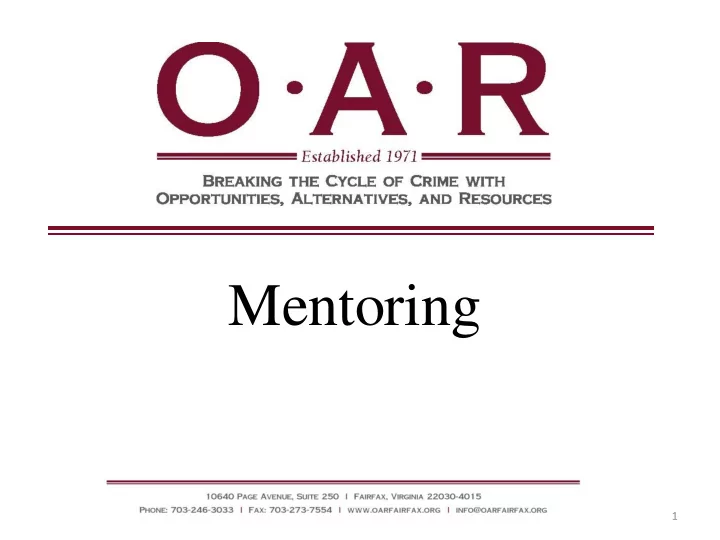

Mentoring 1
Topics OAR History Program Design Matching Factors Mentees Mentors Mentor Training and Support Program Outcomes/Impact Lessons Learned 2
OAR History Pre and post incarceration services for 40+ years Second Chance Act Funding (2009) Mentoring for over 20 years Restorative Justice Organization Fairfax County Adult Detention Center (community partner) 3
Program Design Ideally a prospective Mentee would express interest 120 days prior to release 30 days to screen and pair mentee (interview mentee and mentor to determine motivation for participation) 90 days to establish Mentor/Mentee relationship Potential Mentees with less than one month are not paired Pending Charges: program designed for transitioning back to the into the community 4
Program Design Mentor and Mentee meet 3 to 4 times a month Community meetings held in public places Post-release meetings held in public places Incentives for mentees Mileage reimbursement provided to volunteers Pro-social activities 5
Matching Factors Age Personality/Approach Religious Beliefs Hobbies/Interests Geographic Location 6
Mentees Voluntary Program Recruitment begins at OAR’s After Release Planning Class (90 days prior to discharge) Charges will vary Plan on residing in OAR’s service area Can not have any pending charges Two to four months remaining on sentence 7
Mentees Gift Card Incentive Payment Schedule Amount $25 Visit OAR within 72 hours of release 1 st meeting in Community $25 5 th meeting in Community $25 10 th meeting in Community $50 15 th meeting in Community $50 20 th meeting in Community $75 25 th meeting in Community $100 30 th meeting in Community $150 8
Mentors Qualifications >25 years old Ability to maintain a non-judgmental attitude towards clients Strong communication skills Respectful of individual, cultural, social and religious differences Ability to set and enforce appropriate boundaries Incurred no charges, arrests, convictions, incarceration, or probation within the past 4 years and have no substance abuse problems within the past 5 years 9
Mentors Responsibilities Offer guidance, moral support and reflective listening Help Mentee plan for successful reintegration into the community Provide a supportive relationship Assist the Mentee to foster positive community ties Model positive pro-social beliefs, attitudes, ideas and behaviors Communicate with OAR regarding Mentee’s successes and challenges Documentation – enter progress notes into database (30 minutes of reporting/documentation per month) 10
Mentoring Training and Support Regular support and follow-up from OAR staff Initial and ongoing training opportunities Extensive mentoring program manual Training by the Fairfax County Sheriff’s office Mentor Roundtable 11
2009-2013 Program Outcomes/Impact 115 Enrolled in the program 95 Mentees (pre release participants) 59 Received post release services and %50 completed the post release component 87 Were scored using the OAR’s mentoring matrix and continued the program in the community 4 Mentoring clients did not improve their matrix score 9 Maintained the same score 6 Technical violation, arrest convictions, revocation, incarcerated 12
Lessoned Learned Pairings made 30 days or less before release from incarceration usually fall apart in the community When a Mentee is released from incarceration, a plan should be developed to structure the first two weeks of the Mentee’s release The Mentor must accept their mentee for who they are Peer Mentor training can allow you to leverage the experience and education of Mentors Striking a balance between giving the mentor a defined role and the ability to use some individuality 13
Thank You Any questions WWW.OARFAIRFAX.ORG DOVERTON@OARFAIRFAX.ORG 703-246-3031
Recommend
More recommend